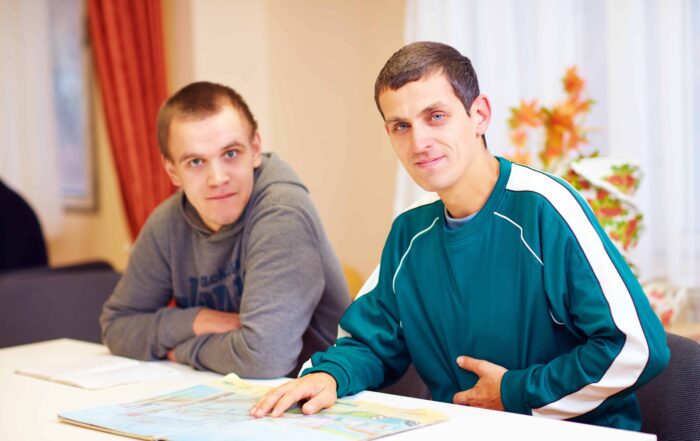College can be challenging for any student, but especially for first-time students with autism.
Right now, there is a new wave of students with autism who are preparing to enter college. Soon they will have to adjust to a new environment and, possibly, learn how to live independently in the dorms.

More students with autism spectrum disorders are attending college than they have in the past.
According to the CDC, 1 out of 54 school-aged students has autism.
These young people are aging out of school and preparing for post-secondary options, including college, and many professors and campus staff do not know how to support them.
My Experience at College
I have autism, and I went to college, earning both a Bachelor’s and a Master’s degree. I was very fortunate to have a generally good college experience. Almost all of my instructors understood that I was different and that I had special needs.
Most of my professors and the disability services office worked with me to provide the right accommodations. I did not live in a dorm because I was able to drive to college from home.
The only negative experiences I had at college were primarily with other students. I am not good at socializing, but I tried. Sometimes, I found myself getting shunned and frowned-upon. I also discovered that many students did not know what autism was. Some even believed that autistic people were monsters waiting to snap, which is not true at all. In spite of these difficulties, I did make some wonderful friends who did understand me.
ASD students need special accommodations to thrive. One of our challenges is socializing. On-campus, we often have a hard time making friends and getting plugged into college groups.
So, the question is, what can parents and college staff do to support us?
Here are some helpful tips and information that I can share based on my own experience attending college.
Services and Accommodations
The first thing parents need to do is get documentation that their child has ASD. Providing documentation allows students with ASD to register with the college’s disability services office. Registering with disability services provides a way for receiving accommodations.
Families should also familiarize themselves with the Americans with Disabilities Act (ADA), which mandates accommodations for people with disabilities in settings such as universities and colleges. Accommodations will vary among ASD students. Some common examples include allowing for more time to get to class, note-takers in the class, and alternative testing locations.
Additional accommodations might include having a special room in the dormitory or having a special place to go during sensory overloads. I would like to see more colleges adopt accommodations like these.
Support from Professors
Professors often don’t know how to support students with autism. Some professors might be scared or intimidated by students with ASD; others may be influenced by stereotypes in the media
The most important thing professors can do is to accept that ASD students are different and that we require special accommodations. This means honoring our accommodations and taking the time to work with us and the disability services office.
Autism is not a behavioral problem.
People with autism are wired differently. For example, some students may ask a question in class, then ask the same question again a few minutes later. Professors may get annoyed with this, but sometimes we need to hear the same thing twice before we get it.
Meltdowns
When an ASD person has a meltdown, it is not intentional. Usually, it is a response to something unpleasant, such as lighting or loud sounds in the environment. Having a plan with a professor to leave the room for a calmer space can be very helpful. Compassionate and caring professors can go a long way in making college a pleasant experience.
Dorm Life
Living on campus can be problematic for people with autism. Some students with ASD may struggle with sharing a room with a stranger. Dorms can also be very loud.
Resident directors also need to understand that they may have a student with ASD who does not socialize and needs special living accommodations. For example, we may need to have a single dorm room without a roommate to avoid constant dysregulation.
Lighting in a dorm room may need to be changed, too, such as the removal of CFL bulbs. CFL bulbs flicker and can cause headaches for some of us on the spectrum.
Learn More

Campbell Teague is an adult with autism; diagnosed at the age of 23. However, it was speculated he was autistic when he was four years old. He earned an Associate’s degree in Natural Science, a Bachelor’s degree in Biology (health science), and in 2013, completed a Master’s degree. He has an interest in Meteorology. He also is a disability advocate and blogs about autism, often integrating his Christian faith into his advocacy.
Examining the Transition to Adulthood in Autism: Challenges and Opportunities in the Aim of Thriving
David B. Nicholas, Ph.D., examines the transition to adulthood and its implications for autistic individuals. He presents the ecosystem mentality and discusses recent findings supporting a holistic and future-oriented
Transitions from Pediatric to Adult Medical Care
Julie Corder, CNP, and Carrie Cuomo, DNP, CPNP, with the Cleveland Clinic Learning Hospital, discuss the critical stages of transition from pediatric to adult healthcare for individuals with complex medical needs. They
Back-to-School Resources
Whether you’re a parent preparing a child for grade school or an adult transitioning into or out of college, the back-to-school season can present unique challenges for families and individuals with autism.
LGBTQIA+ and Autism
Contemporary research on the intersection of autism, sexuality, and gender identity asserts that autistic individuals are more likely to identify as LGBTQIA+ than the neurotypical population. Similarly, the prevalence of autism is
Transportation issues rarely addressed by providers
Very few medical or behavioral specialists discuss driving or other transportation-related issues with patients who have ASD (autism spectrum disorders), according to a new study. Emma Sartin and colleagues surveyed 78 providers,
Challenges of Medical Care for Seniors
Following introductions by Petra Dilman and Dr. Stephen Edelson, Margaret Bauman, MD, discusses the many medical challenges those aging with autism face. She highlights the lack of medical training and research







